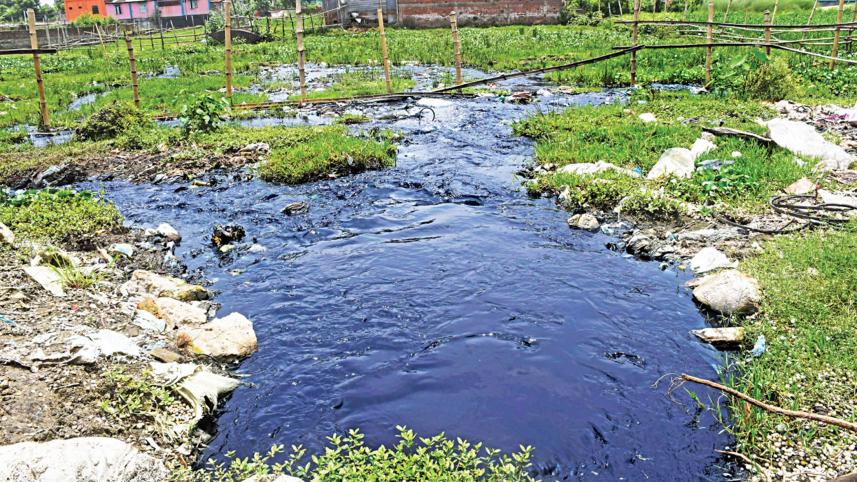Make factories pay for polluting the environment

Coming hard on the heels of a new Intergovernmental Panel on Climate Change (IPCC) report that made dire predictions about the occurrence of more frequent rainfalls, floods, and cyclones in Bangladesh, a report in this daily shows how ill-prepared we still are to face this challenge. It describes how 48 units (out of a total of 185) under the Bangladesh Small and Cottage Industries Corporation (BSCIC) are operating without effluent treatment plants (ETP). To put it simply, across four divisions (Dhaka, Chattogram, Rajshahi, Khulna) of the country, there are 48 industrial factories that are dumping their untreated chemical waste right into open drains, allowing filthy and discoloured water to flow into rivers and even into people's homes during the monsoon season when flooding happens.
One such area is Pagar Alerteg, adjacent to the Tongi Industrial Zone of the BSCIC. Here, rain brings knee-deep floods of black, filthy, foul-smelling water that residents have to wade through during monsoon. It has reached a point that residents now refuse to move there, making the area nearly uninhabitable.
One may wonder how such an issue is allowed to fester in four divisions, or how as many as 48 factories are allowed to dump chemical waste irresponsibly and improperly. The fact is, they are not allowed to operate without the ETPs, but neither the BSCIC nor the Department of Environment (DoE) seems aware of the magnitude of this problem.
Although it is mandatory to set up ETPs for factories that generate chemical waste, as per BSCIC guidelines, the corporation is strangely enough not allowed to penalise factories flouting this guideline. One such factory in Gazipur has begun the process of setting up an ETP after facing pressure from the BSCIC and DoE, but it will take at least three more months for this effort to reach fruition. Others either do not have enough land or necessary financial resources to set up their own ETPs. The BSCIC's plan from two years ago to set up a central ETP in Konabari, Gazipur has also not been implemented yet.
Meanwhile, representatives of the DoE told our reporters that they were not "aware" that so many factories under the BSCIC were operating without proper ETPs, and that they would communicate with the corporation soon regarding this matter. We hope this does happen, and soon, as there can be no excuse to pollute the homes and rivers of the country with harmful chemical waste. Although punishment for offending factory owners is desired, there needs to be a long-term solution to this issue that is hugely impacting the natural environment. We earnestly hope that the DoE and BSCIC will prioritise the building of ETPs at every factory (or central ETPs in each industrial city), instead of exchanging blame while the problem gets worse and worse.



 For all latest news, follow The Daily Star's Google News channel.
For all latest news, follow The Daily Star's Google News channel.
Comments